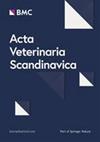Toxoplasma gondii seroprevalence in reindeer (Rangifer tarandus tarandus L.) in northern Sweden: a cross-sectional study from 2014
IF 1.9
2区 农林科学
Q2 VETERINARY SCIENCES
引用次数: 0
Abstract
Toxoplasma gondii is a parasitic protozoan that can infect a wide range of warm-blooded animals, including humans. The infection with T. gondii, is of particular concern due to its potential impact on human and animal health. In Sweden, semi-domesticated reindeer (Rangifer tarandus tarandus L.) is an important species both economically and culturally, but susceptibility to Toxoplasma infection and seroprevalence in reindeer herds remain relatively understudied. A total of 528 reindeer, sampled at two slaughterhouses in Sweden in 2014, were investigated for antibodies to T. gondii. Specific antibodies to T. gondii were found in 5 of 209 (2.3%) tested adult reindeer and in 6 of 308 (1.9%) tested calves, giving an apparent total prevalence of 2.1% (95% confidence interval 1.1–3.8%). None of four putative risk factors studied (sex, age, type of grazing area, county) were statistically associated with T. gondii seroprevalence. Swedish semi-domesticated reindeer are exposed to T. gondii and may harbour infectious tissue cysts. To mitigate the risk of T. gondii infection in consumers, reindeer meat should be frozen or cooked thoroughly before consumption. The global climate change may influence the seroprevalence and possible associated risk factors for T. gondii in reindeer. To be able to manage the risk and get better advice to the consumers there is a need for further investigations covering the whole spectra of herding conditions for reindeer.瑞典北部驯鹿(Rangifer tarandus tarandus L.)的弓形虫血清流行率:2014 年横断面研究
弓形虫是一种寄生原生动物,可感染包括人类在内的多种温血动物。由于弓形虫对人类和动物健康的潜在影响,感染弓形虫尤其令人担忧。在瑞典,半驯养驯鹿(Rangifer tarandus tarandus L.)在经济和文化方面都是重要的物种,但对驯鹿群中弓形虫感染的易感性和血清流行率的研究相对不足。2014 年,瑞典的两家屠宰场共对 528 头驯鹿进行了弓形虫抗体调查。在209头接受检测的成年驯鹿中,有5头(2.3%)发现了淋病特异性抗体,在308头接受检测的幼鹿中,有6头(1.9%)发现了淋病特异性抗体,总患病率为2.1%(95%置信区间为1.1-3.8%)。所研究的四个假定风险因素(性别、年龄、牧区类型、县)在统计学上都与淋病血清流行率无关。瑞典的半驯化驯鹿会感染淋病双球菌,并可能携带传染性组织囊肿。为降低消费者感染淋病双球菌的风险,驯鹿肉应冷冻或彻底煮熟后再食用。全球气候变化可能会影响驯鹿的血清流行率和可能的相关风险因素。为了控制风险并向消费者提供更好的建议,有必要对驯鹿的整个放牧条件进行进一步调查。
本文章由计算机程序翻译,如有差异,请以英文原文为准。
求助全文
约1分钟内获得全文
求助全文
来源期刊

Acta Veterinaria Scandinavica
农林科学-兽医学
CiteScore
3.60
自引率
0.00%
发文量
28
审稿时长
18-36 weeks
期刊介绍:
Acta Veterinaria Scandinavica is an open access journal encompassing all aspects of veterinary research and medicine of domestic and wild animals.
 求助内容:
求助内容: 应助结果提醒方式:
应助结果提醒方式:


